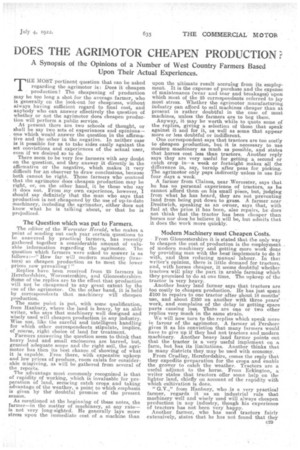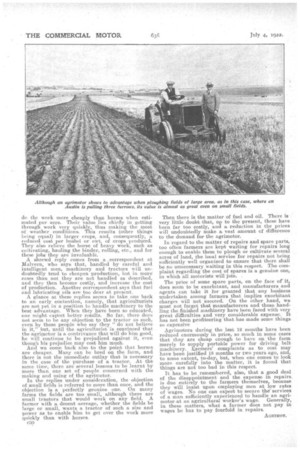DOES THE AGRIMOTOR CHEAPEN PRODUCTION?
Page 25

Page 26

If you've noticed an error in this article please click here to report it so we can fix it.
A Synopsis of the Opinions of a Number of West Country Farmers Based Upon Their Actual Experiences.
THE MOST pertinent question that can be asked regarding the agrimotor is: Does it cheapen production? The cheapening of production may be too long a shot for tho average farmer., who is generally on the look-out for cheapness, without always having sufficient regard to final cost, and anybody who can answer effectively the question of whether or not the agrimotor does cheapen production will perform a public service.
At present there arc two schools of thought, or shall be say two sets of experiences and opinions— one which would answer the question in the affirmative and the other in the negative. In neither case is it possible for us to take sides easily against the set convictions and experiences of the actual user, even if we desired so to do.
There seem to be very few farmers with any doubt on the question, and they answer it directly in the affirmative or the negative, which makes it very difficult for an observer to draw conclusions, because both cannot be right. Those farmers who contend that the agrimotor does cheapen production may be right, or, on the other hand, it be those who say it does not. From my own experience, however, I should say definitely that the man who says that production is not cheapened by the use of up-to-date machinery, including the agrimotor, either does not know what he is talking about, or that he is prejudiced.
The Question which was put to Farmers.
The editor of the Worcester Herald, who makes a point of sending out each year certain questions to he answered by practical farmers, has recently gathered together a considerable amount of valuable information regarding the agrimotor. The question which farmers were asked to answer is as follow e:—" How far will modern machinery (tractors) so cheapen production as to meet the lower prices now prevailing?" Replies have been received from 25 farmers in Herefordshire, Worcestershire, and Gloucestershire. Sense of the replies are to the effect that production will not be cheapened to any great extent by the use of the agrimotor. On the other hand, it is held by correspondents that machinery will cheapeu production.
The same point is put, with some qualification, from Hanbury, where the land is heavy, by an able writer, who says that machinery well designed and wisely used will, cheapen production in any industry. Wise use, like the careful and intelligent handling for which other correspondents stipulate, implies, of course, right choice of land for treatment. Farmers answering the question seem to think that heavy land and small enclosures are barred, but, granted adequate scope and the right soil, the agrimotor has then its best chance of showing of what it is capable. Even there, With expensive upkeep and low prices of produce, room exists for considerable misgiving, as will be gathered from several of the reports.
The advantage most commonly recognized is that of rapidity of working, which is invaluable for preparation of land, securing catch crops and taking advantage of the weather, a point to which emphasis is given by the doubtful promise of the present season.
As mentioned at the beginning of these notes, the farmer—in the matter of machinery, at any rate— is not very long-sighted. He generally lays more stress upon the immediate cost of a machine than upon the ultimate result accruing from its employment. It is the expense of purchase and the expense of maintenance (wear and tear and breakages) upon which m.ost of the 25 correspondents referred to lay most stress, Whether the agrimotor manufacturing industry can afford to sell machines cheaper than at present is rather doubtful in the case of most machines, unless the farmers are to beg them. Anyway, it may be worth while to quote some of the replies, giving a selection of those that speak against it and for it, as well as some that appear more or less doubtful or indifferent.
One correspondent says that tractors are too costly to cheapen production, but it is necessary to use modern machinery as much as possible, and states that horses -cost less than tractors. Another reply says they are very useful for getting a second or catch crop in—a week or fortnight makes all the difference in, say, turnip after peas for picking. The agrimotor only pays indirectly unless in use for four days a week.
A farmer from Claines, near Worcester, says that he has no personal experience of tractors, as he cannot afford them on his small piece, but, judging from what he has heard, they are not preventing land from being put down to grass. A farmer near Droitwich, speaking as an owner, says that, with fuel at the price it has been, also repairs, he does not think that the tractor has been cheaper than horses nor does he believe it will be, but admits that it does the work more quickly.
Modern Machinery must Cheapen Costs.
From Gloucestershire it is stated that the only way to cheapen the cost of production is the employment of modern machinery and getting more work done by providing men with the best; implements to do it. with, and thus reducing reaneal labour. In that writer's opinion, there is little demand for tractors, and, with horses cheaper, it seems doubtful whether tractors will play the part in arable farming which they promised to do at one time. The upkeep of the tractor is very heavy. Another heavy land farmer says that tractors are too costly to cheapen production. He has just spent 2100 in repairs to one tractor after about 18 months' use, and about 2350 on another with three years' work, and complains of the delay in getting spare parts causing loss. There are one or two other replies very much in the same strain, We will now turn to the replies which speak more in favour of the agrirnotor. A farmer at Pershore gives it as his conviction that many farmers would have to give up if they had not tractors and modern machinery. Another heavy land farmer points out that the tractor is a very useful implement on a farm, but has its limitations. Another thinks that in many districts they may be used with economy. , From Cradley, Herefordshire, comes the reply that they expedite preparation for the crops and enable the grower to catch the weather. Tractors are a useful adjunct to the horse. From Eckington, writer states that tractors offer some help on the lighter land, chiefly on account of the rapidity with which cultivation is done.
" G.V.," from Hanbury, who is a very practical farmer, regards it as an industrial rule that machinery well and wisely used will always cheapen production in any industry, though his experience of tractors has not been very happy. Another farmer, who has used tractors fairly extensively, states that he has not found that they c29 do the work more cheaply than horses when estimated per acre. Their value lies chiefly in getting through work very quickly, thus making the most of weather conditions. This results (other things being equal) in larger crops, and, consequently, a reduced cost per bushel or cwt. of crops produced. They also relieve the horse of heavy work, such as cultivating, hauling the binder, rolling, etc., and for them jobs they are invaluable. A shrewd reply comes from a ,correspondent at Malvern, who says that, handled by careful and intelligent men, machinery and tractors will undoubtedly tend to cheapen production, but in more cases than not they are not handled as described, and they then become -costly, and increase the cost of production. Another correspondent says that fuel and lubricating oils a-re too dear at present. A glance at these replies seems to take one back to an early contention, namely, that agriculturists are not yet in a position to handle machinery to the best advantage. When they have been so educated, one might expect better results. So far, there does not seem to be any objection to the tractor as such, even by those people who say they "do not believe in it," but, until the agriculturist is convinced that the agrimotor is a contrivance that will do him good, he will continue to be prejudiced against it, even though his prejudice may cost him much. And we come hack also to the point that horses are cheaper. Many can be bred on the farm, and there is not the immediate outlay that is necessary in the case of the purchase of a tractor. At the same. time, there are several lessons to be learnt by more than one set of people concerned with the making and using of the agrimotor. In the replies under consideration, the • objection of small fields is referred to more than once, and the objection is a perfectly genuine one. On many farms the fields are too small, although there are small tractors that would work on any field. A farmer with a decent acreage, whether the fields be large or small, wants a tractor of such a size and power as to enable him to get over the work more quickly than with horses. e30 Then there is the matter of fuel and oil. There is very little doubt. that, up to the present, these have been far too costly, and a reduction in the prices will undoubtedly make a vast amount of difference to the demand for the agrimotor.
In regard to the matter of repairs and spare parts, too often farmers are kept waiting for repairs long enough to enable them to plough or cultivate several acres of land, the local service for repairs not being sufficiently well organized to ensure that there shall be no unnecessary waiting in this respect. The complaint regarding the cost of spares is a genuine one, in which all motorists will join. .
The price of some spare parts, on the face of it, does seem to be exorbitant, and manufacturers and agents can take it for granted that any business undertaken among farmers that implies exorbitant charges will not sueceed. On the other hand, we must not forget that manufacturers and those handling the finished machinery have been faced with very great difficulties and very considerable expense. It has not been profiteering that.has made some things so expensive Agrimotors during the last 12 months have been i reduced enormously n price, so much in some cases that they are cheap enough to have on the farm merely to supply portable power for driving belt machinery. Xarmers' complaints as to cost may have been justified 18 months or two years ago, and, to some extent, to-day, but, when one comes to look more carefully into the matter, it is found that things are not too bad in this respect.
It has to be remembered, also, that a good deal of the disappointment and the expense in repairs. is due entirely to the farmers themselves, because they will insist upon employing men at low rates of wages. No one can expect to secure the' services of a man sufficiently experienced to handle an agrimotor at an agricultural worker's wage. Generally, in these matters, what a farmer does not pay in wages he has to pay fourfold in repairs.








































